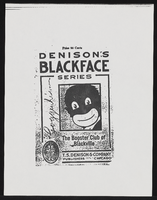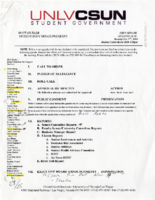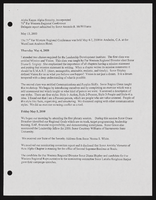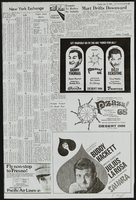Search the Special Collections and Archives Portal
Search Results

Angela Castro oral history interview: transcript
Date
Archival Collection
Description
Oral history interview with Angela Castro conducted by Stefani Evans, Cecilia Winchell, Kristel Peralta, Vanessa Concepcion, and Ayrton Yamaguchi on November 05, 2020 for the Reflections: The Las Vegas Asian American and Pacific Islander Oral History Project. Castro begins the interview by talking about her early life, childhood, what Guam was like, and the history of her parents and grandparents. She describes the difference in public and private education in Guam and compares it to the United States. She explains the reason why she moved to Las Vegas, Nevada in 1998 and attended the University of Nevada, Las Vegas for public relations. Castro then talks about the differences between older and newer generations, the political atmosphere in Guam, and the differences between the United States and Guam in politics. She also talks about the discrimination she has experienced throughout her life and diversity in the workplace. Lastly, she describes her culture and traditions during holidays, the struggles with an absence of culture within her family, and her personal religious beliefs.
Text

Depictions of Black people in various media and advertisements (including offensive caricatures, racist slogans and names, and non-Black people in Blackface)
Date
Archival Collection
Description
Folder from the Roosevelt Fitzgerald Professional Papers (MS-01082) -- Personal and professional papers file.
Mixed Content

Meeting minutes for Consolidated Student Senate University of Nevada, Las Vegas, November 5, 1987
Date
Archival Collection
Description
Text

Meeting minutes for Consolidated Student Senate, University of Nevada, Las Vegas, October 27, 2008
Date
Archival Collection
Description
Text

Alpha Kappa Alpha Sorority, Theta Theta Omega Chapter 71st Far West Regional conference reports
Date
Archival Collection
Description
From the Alpha Kappa Alpha Sorority, Incorporated, Theta Theta Omega Chapter Records (MS-01014) -- Chapter records file.
Text
Charles S. Sprague and Benjamin Gill Papers on Nevada Mining
Identifier
Abstract
The Charles S. Sprague and Benjamin Gill Papers on Nevada Mining (1904-1925) are comprised of various records from the mining companies owned and operated by businessmen Charles S. Sprague and Benjamin Gill who were active in the central Nevada boomtowns of Goldfield and Tonopah in the early twentieth century. Documents include correspondence, receipts and invoices, detailed records and copies of government legislative bills relating to the mining industry, and other business correspondence. Sprague's collection consists of his mining business correspondence dating from 1906 to 1925. Gill's papers are comprised of his business correspondence from 1916 to 1922.
Archival Collection

Transcript of interview with Stella Champo Iaconis by Kay Long, May 14, 1997 & September 1997
Date
Archival Collection
Description
The Champo family, Jacinta and Manuel Champo and their daughter Stella came from Italy to Las Vegas in 1912. They lived in a room at the Union Hotel, which was located at Main and Bridger. In 1917, the Champo family bought a small ranch located about three miles south of what is Henderson today. Manuel grew fruits and vegetables at the ranch and sold them in town door to door. Stella began her education at Las Vegas Grammar School at Fourth and Bridger in 1918 and started babysitting for many of the local women when she was only ten years old. Jacinta’s death in 1927 was hard on both Stella and Manuel. Stella decided not to finish her education. Maude Frazier, who was the principal at the High School, tried to persuade Stella to stay at school. However, Stella had no more interest in school and at eighteen years old she started her career as a waitress. Her first job was at a small Italian restaurant at the Union Hotel where she learned the business. She worked as a waitress and cashier and when P.O. Silvagni opened the Apache Hotel at Second and Fremont she went to work there. Stella continued to work at the Apache until she moved to Los Angeles where she worked as a waitress for eighteen years. Stella had married John Iaconis in 1953 and they moved back to Las Vegas. Both John and Stella went to work at the Sahara Hotel. Stella was a showroom waitress and John was a tailor with his own valet shop in the Sahara Hotel. Stella worked in a showroom at Sahara for three years because it was physically demanding work. Stella went to work at Larry’s where she stayed for twenty years. Stella continued to live in Las Vegas until her death on January 18, 1998 . She was happily retired and always remembered the past and the lessons she learned from her hard work. Stella was a very optimistic and totally self-reliant woman.
Text

Steve Jones and Bart Jones interview, Novermber 7, 2016: transcript
Date
Archival Collection
Description
Brothers Steve and Bart Jones live and breathe Las Vegas history. Their grandparents, Burley and Arlie Jones, arrived in Las Vegas in the nineteen-teens; their father, Herb Jones; his sister, Florence Lee Jones Cahlan, and their uncle, Cliff Jones, helped form the legal, journalistic, and water policy framework that sustains Southern Nevada today. The Jones brothers build on that foundation through their custom home-building company, Merlin Construction. In this interview, they talk about living and growing up in Las Vegas, of attending John S. Park Elementary School, of hunting in the desert, of their family's commitment to cultural and racial diversity, and of accompanying their grandfather to his business at the Ranch Market in the Westside. They share their early work experiences lifeguarding and later, dealing, at local casinos as well as second-hand memories of the Kefauver trials through the tales told by their father and uncle. Steve describes mentor Audie Coker; he explains
Text


